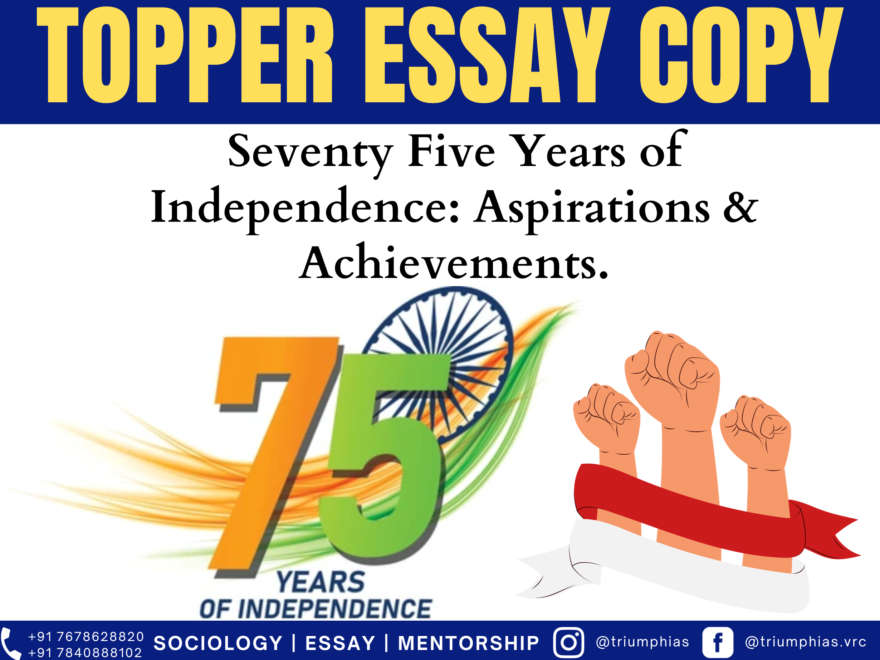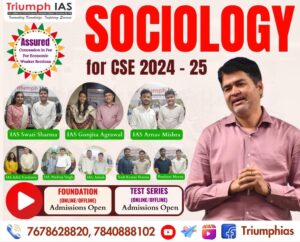IPS, SANKET KUMAR

Essay Topic:
Seventy Five Years of Independence: Aspirations & Achievements.
(Relevant for Essay Writing for UPSC Civil Services Examination)
Seventy Five Years of Independence: Aspirations & Achievements.On 15th August 1947, India got its independence from British Rule. But it was not independent in the real sense, as it inherited immense poverty, uncontrolled expanding population, distorted social fabric, live wounds of partition, ruptured market, and a struggling economy. But what we had was the confidence of defeating the invincible power, a feeling of nationalism running through the blood of Indians, pride in the sacrifices made by Indians, and visionary leaders ready to go to war for a second war of independence against inherited enemies for colonial rule. With the enactment of the constitution on 26th January 1950, India clarified its aspirations and the process through which it is going to achieve them. With the introduction of the Five-Year Planning System, implicit aspirations in the Indian constitution became more explicit, like the importance of agriculture, heavy industry, etc. In this essay, we are going to critically analyze the various aspirations of India and how far we have been successful in achieving them. What are the challenges and how should we tackle them? India is a country of the great Emperor Ashoka, who once ruled an empire on vast Indian subcontinent. His aspirations of ‘Dhamma’, mutual respect, love, and respect for elders helped him rule such a vast empire. Mughal Emperor Akbar, through the policy of tolerance to all religions, giving higher positions to the Rajputs, and preserving the interests of all empires, successfully ruled over India. With such glorified teachings, independent India also prepared its aspirations. Socially, aspirations of strengthening and preserving the diversity of India were dreamed of through the 7th constitutional amendment Act; states were reorganized based on language. The constitution also provided safeguards to all religions and minorities. But with the rise of communalism spreading hatred, regionalism demanding secession, and casteism dividing people, the aspiration of strengthening and preserving the diversity is in threat. The aspiration of providing equal rights to women through emancipation from social evils and further empowerment by education was conceptualized. With the universalization of women’s enrollment in education, increasing percentage of women in jobs, and diluting social evils like the Sati system and dowry practice, the aspiration was achieved to a great extent. But increasing cases of sexual harassment, rape, domestic violence, and preference for male children are a dent on this aspiration. Dalits constituting around 17% of the Indian population deserve equal status as that of upper castes. Through the SC/ST Atrocities Act, prohibition of manual scavenging work, and abolition of untouchability, aspirations of Dalits have been achieved to a very great extent. Despite this, still millions of Dalits are involved in menial work. They are still underrepresented in administration. Violence is rampant. For scheduled Tribes constituting 8% of the Indian population, a better lifestyle and integration with Indian society were their aspirations. Through Nehruvian gradualism development model, Tribal Panchsheel policy, and constitutional provisions under the 5th & 6th schedule for their development, aspirations were tried to be achieved. But still high illiteracy (46%), unhygienic living conditions, poor health facilities, lack of adequate livelihood opportunities are a dent on their aspirations. Peasants often termed as ‘Annadaata’ consisting 50% of the population. For them, land rights, security of tenure, appropriate remuneration of their crops, timely support with backward linkages were aspirations. Introduction of MSP system, open procurement policy subsidized electricity & fertilizers, allowing for contract farming, land reforms were done to achieve their aspirations. But it has remained largely unsuccessful as only 6% of farmers get to sell their produce under MSP; APMC mandi became the place of farmer exploitation; only 15% of selling prices reaches farmers; increasing instances of farmer suicide were seen. For India, population stability was a major aspiration. Being the 2nd most populous country but on the way to become first. Bringing fertility rate to ‘2.1’ the replacement level was one of the aspiration. As per various reports we are approaching the replacement level. But it varies across the states. Northern states like UP & Bihar are having fertility rate even more than ‘2.5’. Thus inclusivity in aspiration has not been achieved. When we consider aspirations in the political domain, on the eve of independence India aspired to achieve social economic Democracy along with political democracy. Directive principles under part IV of Indian constitution drafted the vision of socio-economic democracy. Through 97th constitutional Amendment Act, mage code Bill, legal services Authorities Act, Maternally Benefit Act, these aspirations were very much realized. But still presence of internal economy, gender wage gap as highlighted by WEF, different personal levers for Hindu & Muslims have prohibited full realization of aspiration. Another aspiration was giving representation to the unrepresented in administration & legislation. Reservation of seats for SC/ST as per proportion to the population at all levels of legislative bodies was provided in this regard. Reservation of 1/3rd seats for women in local bodies was done under the 6th & 7th schedule. Autonomous councils consisting of representatives of Tribal groups were provided. But still only 14% of women are in any legislative body. Despite women winning seats in panchayats, their husbands do the work on their behalf. Therefore, the aspiration is still unrealized. The aspiration of Good Governance, where the citizen & public servants will have a master-servant relationship. Administration on the basis of Accountability, Responsibility & transparency will be built. But even after 75 years of Independence, the feeling of a colonial regime is present. Elitist mindset, Red Tapism, corruption, Exercise hierarchy have not let the realization of aspiration. Poverty & Hunger Free was the dream of everyone at independence. Many steps were taken in this regard; livelihood schemes like National Rural livelihood. Mission were started for wage generation, MGNREGA scheme was introduced. Social Security Schemes like Atal pension Yojana, ESTC etc were enacted. To tackle hunger, NFSA made Food distribution through PDS a legal right, Annudata Annasansakshara schemes, mid-day meal schemes, PM Mather vandona yojana, PM kisan samman Nidhi were introduced. But still India has the highest number of poor around 21% of the population globally and around 194 millions are undernourished. Another Aspiration of a 5 trillion Economy along with inclusive development by 2022 was conceptualized. Schemes like National infrastructure pipeline, Banking Reforms, Bottom-up of development model were introduced. Today we are the 5th largest economy globally 3rd in terms of PDP. But still inequality is on the rise, Oxfam report says 51% of wealth is controlled by 1% of the population. As we have seen various aspirations conceptualized by India, the efforts we have taken to achieve them and the achievement and shortcomings at 75 years of independence. The need of the hour is to further ramp up our efforts. Socially, disparity in development based on religion, region castes needs to be bridged to mitigate the threats of unity women Education & their representation in politics & Administration needs to be improved though incentives & innovations. For Dalits Education, Skill teaming, better health needs to be provided |
To master these intricacies and fare well in the Sociology Optional Syllabus, aspiring sociologists might benefit from guidance by the Best Sociology Optional Teacher and participation in the Best Sociology Optional Coaching. These avenues provide comprehensive assistance, ensuring a solid understanding of sociology’s diverse methodologies and techniques
Meta Tags:
Urbanisation, Blessing, Disguise, Economic Growth, Cultural Diversity, Environmental Challenges, India, Social Inclusion, Sustainable Development, SDG Goals, Urbanization is a blessing in disguise, Laxman Tiwari, Laxman Tiwari upsc, Laxman Tiwari CSE, Laxman Tiwari Essay copy, Laxman Tiwari Essay test copy

Why Vikash Ranjan’s foundation Classes for Essay?
Proper guidance and assistance are required to learn the skill of writing essay topics in CSE examination. VIKASH RANJAN SIR at TRIUMPH IAS guides students according to the Recent Trends of UPSC, making him the Best Essay Teacher for Essay writing UPSC.
At Triumph IAS, the Best Essay Writing Coaching platform, we not only provide the best study material and applied classes of Essay for IAS but also conduct regular assignments and class tests to assess candidates’ writing skills and understanding of the subject.
Choose The Best Essay Writing Teacher for IAS Preparation and Know our Approach for Essay?
- The Programme is Planned & Executed in a Way that You Write a good Essay for obtaining Effective Score of 140 Plus.
- In this programme we provide Classes on
- How to INTRODUCE The Topic in Context of the THEME of the Essay
- How to Elaborate & Explain the Topic-Theme on Temporal Scale & Sectoral Scale as well as Intellectual Scale in the MAIN BODY of the Essay.
- How to Sum up the Topic in CONCLUSION in Context of the Essay Topic Theme.
- ︎We will Teach You How to use the Knowledge Matrix of General Studies & Optional to write a Good Essay more Logically and Coherently.
- After the Classes You have to “Write to Learn & Learn to Score” .This means You have to Write the Essay Test Papers & Learn from the Feedback & Discussions.
Why Essay is Important and What We Offer in “Essay Test Series”?
- Triumph’s Essay Upgradation Test Series (Under Personal Guidance of Vikash Ranjan Sir) doesn’t only focus on improving student’s linguistic skills but also focus on improving student’s ability to comprehend the topic-sentence (subject) recall & relate the facts, concepts, propose thesis-statements, and logically assimilate the ideas & counter ideas with clarity in expression on temporal & Sectoral Scales of knowledge.
- Further students are provided one-on-one INTERACTION* Session with Vikash Ranjan Sir. Students get personal feedback on their strength and weaknesses, regarding what is ‘good about their essay and what more should be done to make it a better one’ by Vikash Ranjan Sir.
Why to take up this “Essay Test Series and Foundation” Course?
- Essay is Low hanging Fruit. Marks in Essay is Effectively Contributing in Final Selection in New Pattern of Mains Exam. With a Well Developed ‘Knowledge Matrix and Rigorous Practice’, One can Score upto 160 + in Essay. So IAS Aspirants should never Ignore Essay Preparation
- Inculcating Writing Competency in Essay for IAS, which is Different from Essay in English, Essay in School and College.
Follow us :
🔎 https://www.instagram.com/triumphias
🔎https://www.youtube.com/c/TriumphIAS
🔎https://t.me/VikashRanjanSociology
Find More Blogs…
| Compare and contrast Karl Marx’s and Max weber’s | Karl Marx- Historical Materialism |
| Position of Women In the Modern Indian Society | Sociology: Social system and pattern variables |
keyword: Seventy Five Years of Independence: Aspirations & Achievements. Seventy Five Years of Independence: Aspirations & Achievements. Seventy Five Years of Independence: Aspirations & Achievements. Seventy Five Years of Independence: Aspirations & Achievements. Seventy Five Years of Independence: Aspirations & Achievements. Seventy Five Years of Independence: Aspirations & Achievements. Seventy Five Years of Independence: Aspirations & Achievements. Seventy Five Years of Independence: Aspirations & Achievements. Seventy Five Years of Independence: Aspirations & Achievements. Seventy Five Years of Independence: Aspirations & Achievements. Seventy Five Years of Independence: Aspirations & Achievements. Seventy Five Years of Independence: Aspirations & Achievements. Seventy Five Years of Independence: Aspirations & Achievements.


